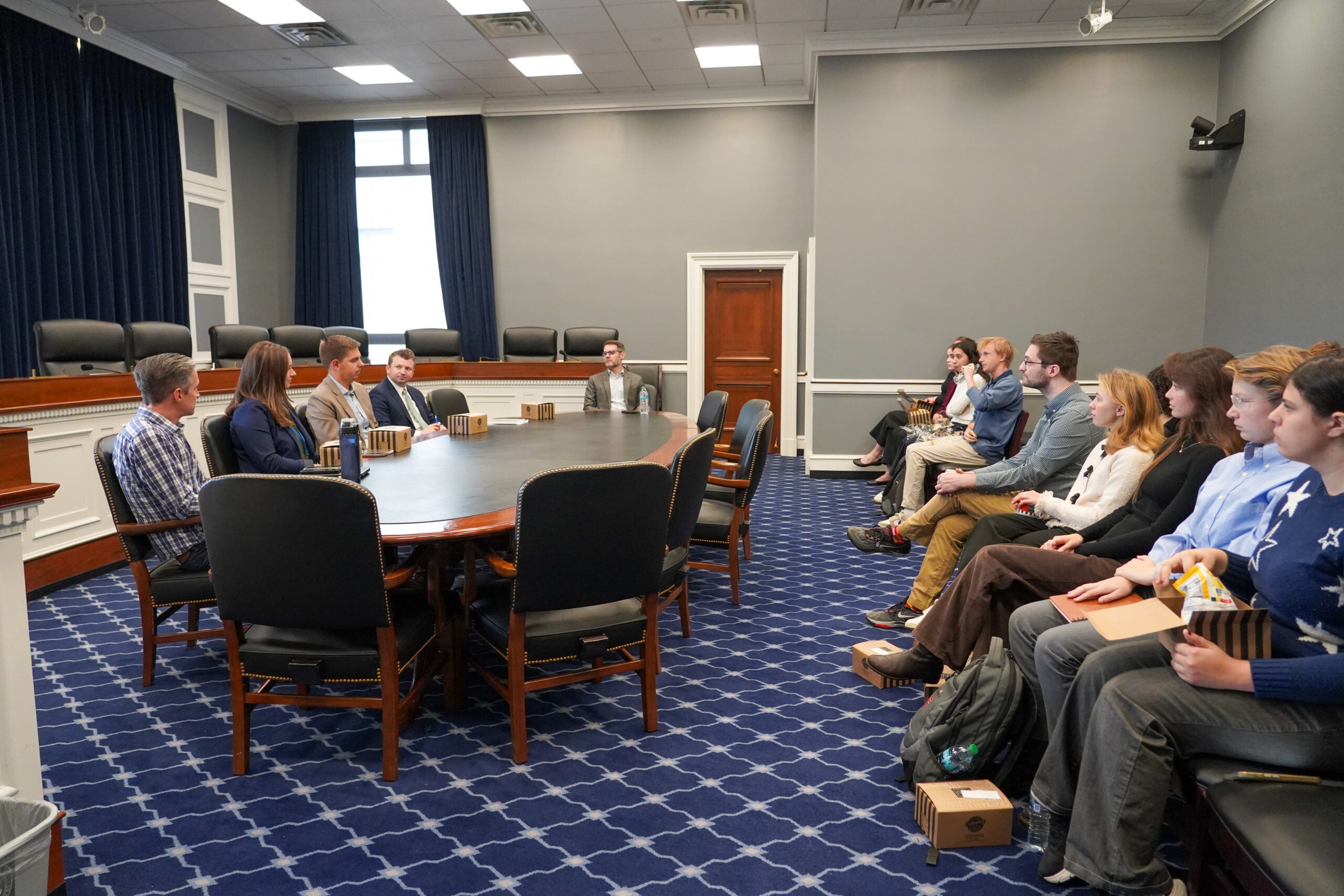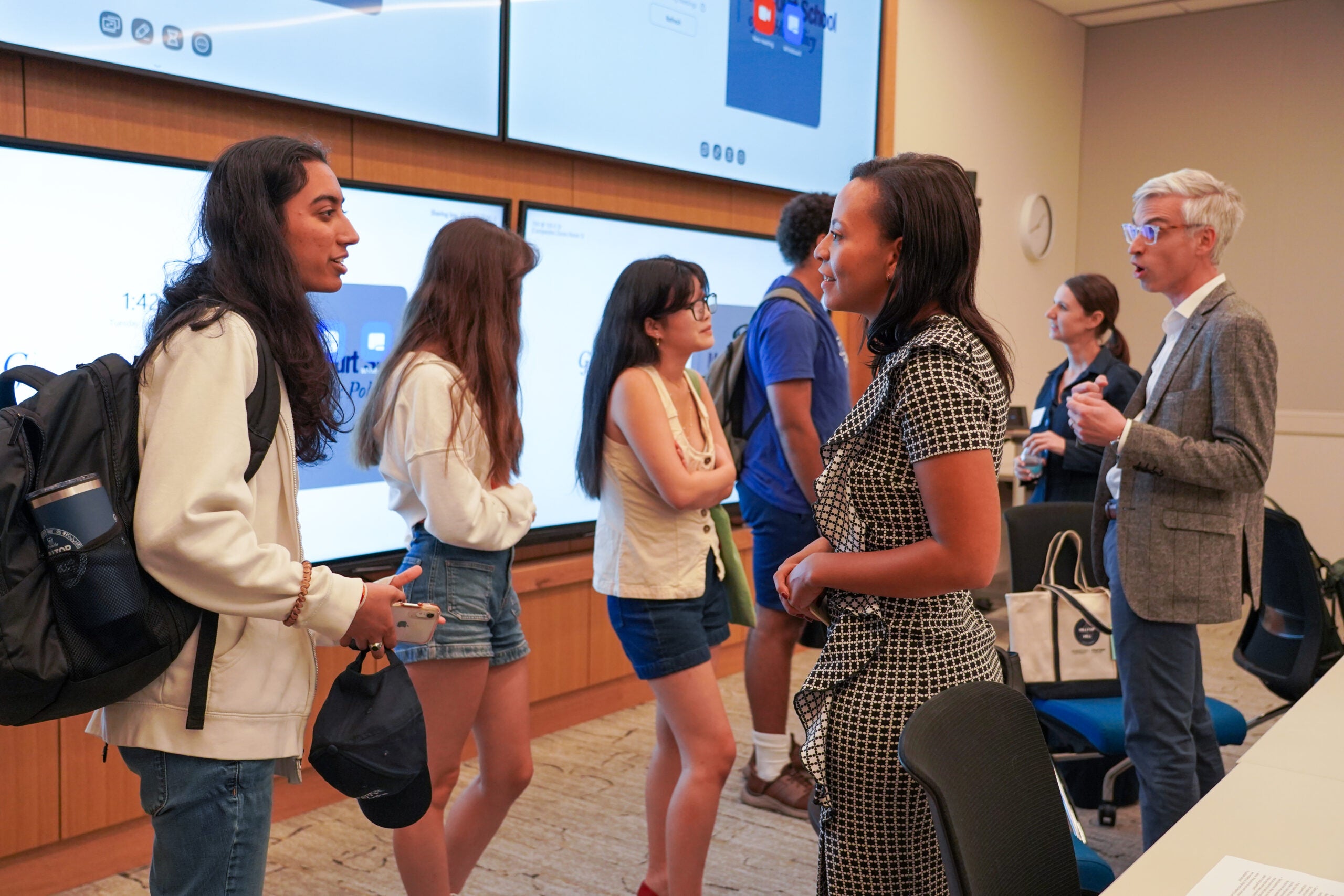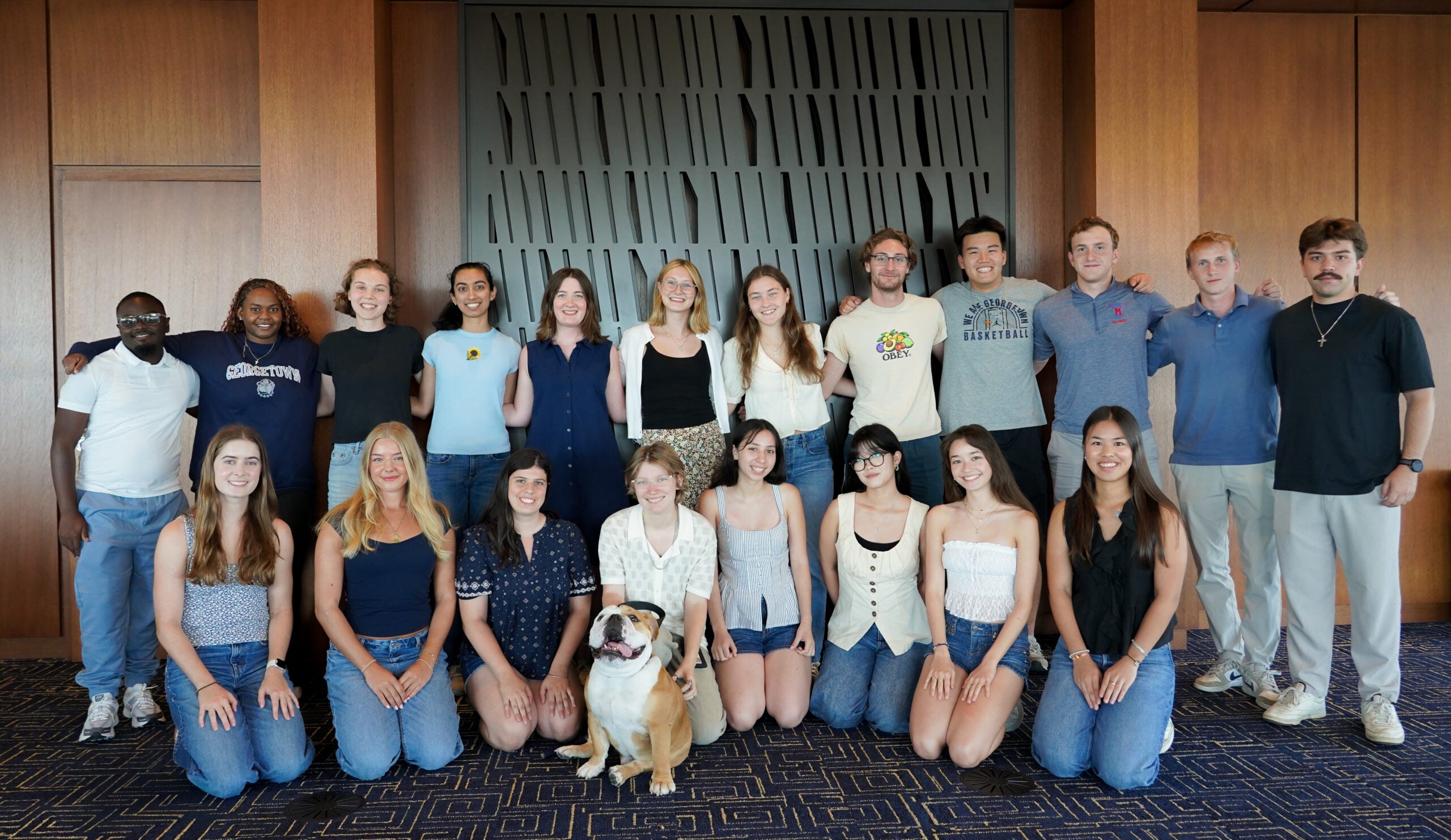Learning About Policy Where Policy is Made: Inside Georgetown’s New Undergraduate Program
For the Joint Program in Public Policy inaugural cohort, public policy is not just theory — it’s embedded in their campus experience.
The Joint Program in Public Policy (JPPP), offered jointly by the McCourt School of Public Policy and Georgetown’s College of Arts & Sciences, allows students to split their undergraduate journey between Georgetown’s Hilltop campus and the Capitol Campus in downtown Washington, DC. This program’s design reinforces its core premise: to train students in public policy in the place where policy unfolds.
The degree, which combines a liberal arts and policy-focused curriculum with living and learning opportunities on the Hilltop and downtown Washington, DC, offers students of the class of 2027 and beyond the opportunity to graduate with a bachelor of arts (A.B.) in public policy.

JPPP students attending their monthly “Public Policy in Action” lunch seminar. The October seminar was on Capitol Hill and focused on energy and environmental policy, and featured four congressional staffers.
A training ground for the next generation of changemakers
James Habyarimana, faculty director of the program and distinguished professor at the McCourt School, explains how the program’s curriculum prepares students for careers in public policy and related fields.
“It is first and foremost a problem-driven degree that addresses pressing problems at the local, state, national and international levels,” says Habyarimana. “The JPPP curriculum builds on the rich liberal arts training provided by Georgetown University’s College of Arts and Sciences and equips students with the interdisciplinary tools required to understand and address policy problems, drawing on a wide range of theoretical and methodological tools.”

JPPP students attending their monthly “Public Policy in Action” lunch seminar. The September seminar focused on local government and featured the mayor of Alexandria, Virginia and policy staff from the District of Columbia.
Building on that foundation, Associate Dean of Academic Affairs and Teaching Professor Barbara Schone spotlights the program’s focus on experiential learning.
“All of our students will do a policy internship or a capstone project during their senior year to apply what they have been learning in the classroom,” says Schone.
She notes that the program not only teaches students the foundations of public policy but also goes further by giving them the tools to measure outcomes and navigate tradeoffs in the real world. “Due to limited [societal] resources, we need to have a sense of what policies work and which ones don’t to design effective policy,” says Schone. “A big theme in the Introduction to Statistics and Data Analysis course I teach, which is a required course for public policy majors, is helping students to understand when they have good evidence or not-so-good evidence about whether a policy works.”
A student’s perspective: From the Hilltop to the Hill

Brooks Clifford, second person from the right, (C’27) pictured with members of the program cohort and Jack the Bulldog
For Brooks Clifford (C’27), a member of the inaugural cohort, the program is as much about place as it is about curriculum.
“The most exciting aspect of my experience with the JPPP program so far has been living in DC itself,” says Clifford. “I got to spend two years on the Hilltop Campus and now get to spend two years living in the city. Being in the middle of DC also gets you access to many new parts of the city.”
But the downtown charm for Clifford is more than scenic — it’s strategic.
He details how his courses are taught through a policy lens, connecting abstract theory to practical challenges. As part of the JPPP curriculum, he’s taking the program’s required courses, including Introduction to Statistics & Data Analysis, Introduction to Economics for Public Policy and Political Analysis for Public Policy, preparing him with the foundation needed to understand the world of public policy.
Reflecting on his coursework, he says, “I appreciate how classes in the JPPP incorporate a policy perspective into every course, helping you learn why these concepts are important and how they are applied to policy issues.”
Being on the Capitol Campus has also allowed Clifford to dive into his interest in the legal field through a minor in Law, Justice and Society.
“I have wanted to explore law as a career option for the past few years, and being on the Capitol Campus has allowed me to do that,” he notes. In the past few weeks, I have had the opportunity to visit the DC Superior Court, DC District Court and listen to lawyers with experiences in a variety of fields.”
Finding community on the Capitol Campus
In addition to the academic rigor the program offers, Clifford notes that living downtown has expanded his involvement in extracurricular activities and helped him build new connections.
He’s active in the McCourt School’s Policy Innovation Lab, which partners with local organizations in DC’s Wards 7 and 8, and serves on a Student Leadership Team for the Tech & Public Policy program’s Fall 2025 Visiting Fellows. He has also stayed connected to the Hilltop through Club Men’s Ultimate Frisbee and Club Men’s Squash.
“I was immediately able to find organizations that would help me to learn more about and get involved in the policy areas I am interested in,” he reflects. “What I have been enjoying the most is the people on the Capitol Campus. Because we’re a small cohort, you get the opportunity to get to know an interesting group of Georgetown students who share similar interests to you.”
Though balancing life between both campuses sometimes can be a challenge, Clifford highlights that the experience is worthwhile.
“I wouldn’t say there aren’t difficulties in getting between campuses at later hours and on weekends,” he reflects. “It’s definitely manageable if you want to stay connected, which many JPPP students and I do. Additionally, living on 55 H St. is one of the best places I’ve lived at Georgetown so far.”
When asked what advice he’d give to future students, Clifford encourages them to think about what they value most in their college experience.
“If you value real policy engagement, living in a new environment and helping shape a growing academic community on the Capitol Campus, then the JPPP program is the place for you,” he says.
Clifford adds that students considering the program should be intentional about maintaining the communities they’ve built on the Hilltop Campus. By combining liberal arts breadth, public policy analysis and experiential learning in the heart of Washington, DC, the JPPP is shaping undergraduates who don’t just study change — they’re ready to lead it. Learn more about the program.
- Tagged
- JPPP